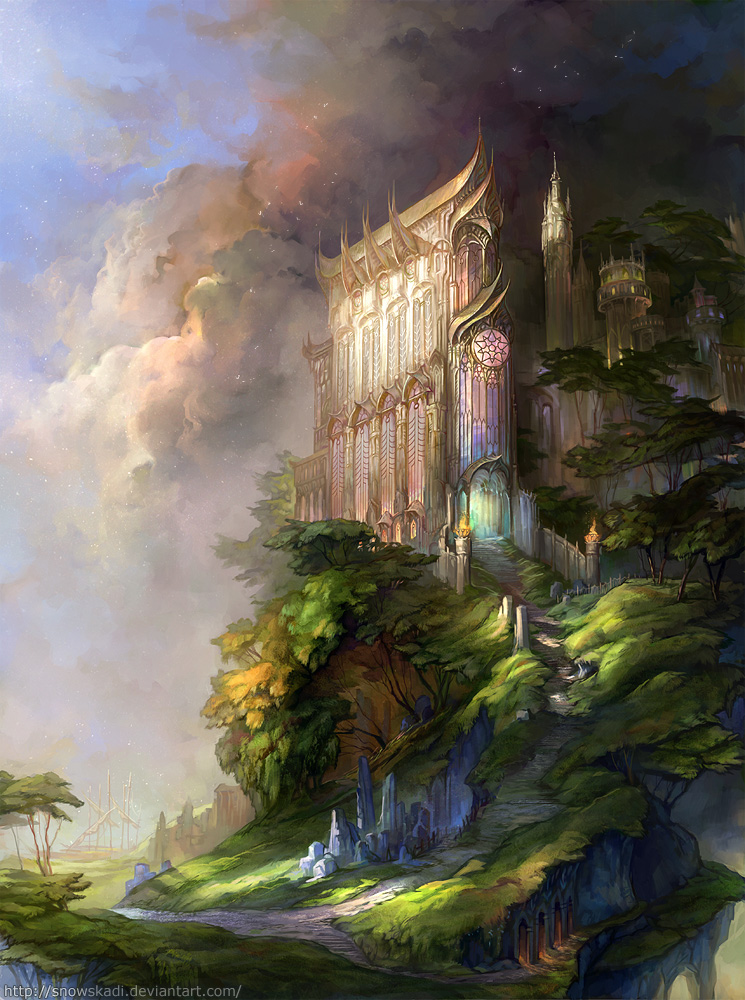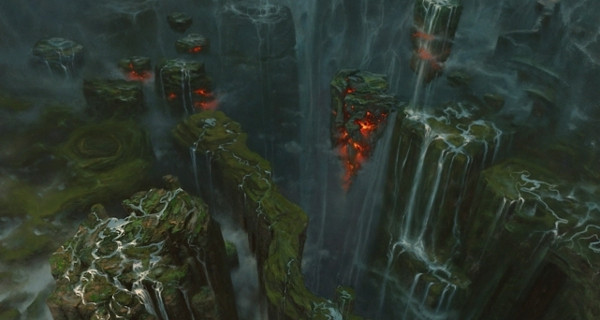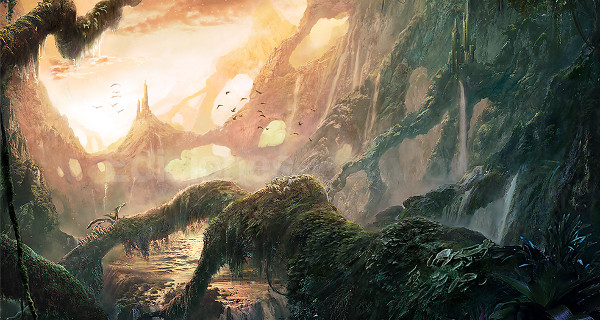Addendum: This post was actually written before The Arcane Triad, but I'm posting it as an addendum to that post, with further descriptions of the differences that there could be among the three famous arcane casters, Wizard, Sorcerer, and Warlock.
Both posts were written quite some time before having playtest material, so they do not reflect the actual D&D Next context, but still a possible one, since two of the three classes are still very much under construction, and the Wizard could be subject to changes too!
 |

There have always been classes that people (and developers) always perceived as too similar.
With 4e and its formalized Power Source and Role, they had a good chance to get rid of this problem, but pigeonholing the classes into just one role was too strict, and the "needless symmetry" they so much wanted to avoid returned in many cases IMO.
I think this is because of two things:
- They didn't have clear concepts of what REALLY differentiated classes, their true souls, and they instead went for pure combat roles differences mostly. They recognized this in part with Essentials, where they created sub-classes instead of new classes.
- They wanted to force every class under the same progression, power system and general mechanics. They recognized this flaw with Essentials with classes that were balanced with no dailies or fixed encounter or only at-wills.
I'm not going to discuss much about the hierarchy of classes, how they have to be organized and so on. I will talk about their inherent differences and how can this reflect on mechanics, not only combat mechanics (see my previous blog post and the links therein for more on this). You're gonna see I'll use the term "Methods" a lot, because I think it's what really matters in differentiating classes.
"Problematic" casters: Wizard, Sorcerer, Warlock
Wizard
Ahh, the Wizard. It's such a wonderful concept (and perhaps even WORD), and it has been traditionally so powerful that sometimes we think all other arcane classes are just pale imitations of it. This can be a problem.

What are (or should be) the Methods of the Wizard?
- Studying (Intelligence)
- Memorizing a few spells from a wide selection
- Changing the course of battles or challenges with complex effects
- Having to manage resources well (although I don't want to return to "out of spells" moments)
- Not much variability on spells. Bigby's Crushing Grip can't become Bigbuy's Crushing Fist.
Outside of combat, a Wizard can overcome his lack of flexibility by researching new spells. He can't modify spells, but he has access to a vast knowledge, so it doesn't really matter: as long as he prepares ahead, he can overcome any challenge.
All possible Combat Roles:
- Controller: classical generalist Wizard. The battlefield changes thanks to him. It's not encounter-winning, but encounter-changing. Many different spells, but more resource managing.
- Striker: classic battle-mage Wizard. Spells of the same school could mean more powerful and usable derived at-wills and encounter spells, so less resource managing, but you'd loose the great versatility of the generalist.
- Defender: yes. Specializing in shielding magic, Abjuration, would make for a Defender Wizard. Squishy? Yes, but try and hit him/her. Enchantments would help "mark" the targets, Illusions would make their strikes swing to thin air.
- Leader: again, yes. Maybe can't cure wounds, but can boost the normal resilience with Transmutation and can grant a lot of tactical boons, from flying to invisibility.
_________________________________
Sorcerer
The Sorcerer is probably the most neglected class of history. Especially for being the one that should represent the most "inherently powerful" characters. The problem comes from the fact that it was born just as a mechanic variant of the Wizard, and maybe from the fact that its name doesn't convey the difference. I think Elementalist could be a better name for it, with Sorcerer being used just to represent a special type of Elementalist, but this is just an idea like any other.

What are (or should be) the Methods of the Sorcerer?
- Having magic inside their bodies (Constitution!! It could be visible or not: his magic could be strong because of his body, or his body strong because of his magic, that's flavor decision up to the player! Update! Different seeds of magic could require different abilities and that would be the limiting factor! Maybe elements would require physical stats, with Lightning tied to Dex, Fire to Str, Cold to Con and so on; while more abstract forces would be tied to Cha or Wis. The sorcerer should represent that you use your own body or characteristics to control soeme types of magic that come natural to you)
- Having access to very few "spell-seeds" to produce at-will and/or encounter effects on the fly, morphing different "spells" each time they cast.
- Blasting from up front and sustaining damage thanks to the protection offered by their resilient bodies and the elemental magic that should linger around them depending on what spells they cast.
- Few "spell-seeds". You can't master all elements, you can't master complex magic. You could be a "charming sorcerer" too maybe, but you'd be managing that through lot of specialization.
- To change your areas of expertise, your specialization, you'd need much more time than a Wizard, so overcoming many different challenges could be more difficult (but not impossible)
- You don't know a lot about magic normally. You just "have it".
They'd also have automatic effects coming out from the spell-seed they use. After having used Fire, they burn creatures attacking them, after having used Cold they slow movements around them and so on.
Out of combat, a Sorcerer may be so good at morphing magic that tasks such as opening locks could be done by creating force-keys out of thin air, and movement challenges could be won by creating ice bridges, or flying empowered by a mini storm. Anything nature can do when angry, the Sorcerer can replicate. And more!
All possible combat roles:
- Striker: a resilient blaster type
- Defender: specializing in melee magic. Resilience through Constitution and elemental halos, a magical "tank" with no weapons.
- Controller: specializing in walls and areas, less damage, more hassle
- Leader: spells buffing allies. Everyone does more damage and is more resistant.
_________________________________
Warlock
If the Sorcerer is the most neglected class, the Warlock is the more confused. While there's at least the fixed point about Sorcerers that they're the ones with magical bloodlines giving them power, Warlocks have been the ones forging pacts, binding entities (but then again Wizard could summon better demons at level 1! :-( ), and then also the ones specialized in never-ending spells that are more supernatural than the others, seeming to rob the Sorcerer "magic is in me" gimmick.
So I have ideas here too...

What are (or should be) the Methods of the Warlock?
- Receiving magic from an external entity, not through inspiration such as Divine characters, but through force of will and guile (Charisma)
- Having access to a few "dark powers" that are the staple of all warlocks. Eldritch blasts and strikes, supernatural boons to skills, summoning of impish servants/counselors and anything that feels supernatural and for some reason "wrong" or "dangerous" in the magic world.
- Forming dangerous pacts with powerful entities. These give the warlocks those powers that he can't choose to have or not to have. He could select from a very restricted few, always connected to his/her Archfey or Archdevil or Elder One "master". These powers should include summoning of specific beings and powerful, lingering hexes.
- Just as he has advantages typical of the Sorcerer (at-will magic) and the Wizard (complex spells), he also has weaknesses typical of both. Limited access to the powerful spells (not because remembering his hard, but because the entity doesn't grant powers at the Warlock's whim), and limited selection of both powerful spells and at-will supernatural abilities.
- His patron can require sacrifices. His strongest spells damage him and/or his allies maybe, or the summons could turn against him or his allies if not managed properly. This should really just suggest certain styles of play above others.
- As the sorcerer, your power over magic isn't based on knowledge, or not deep one. You have to study it independently if you want to understand better.
Maybe you can use the powerful dailies only after the first battle, or the second or the third, when you have collected the necessary souls/pain or whatever. Then you have the at-will and scalable supernatural abilities. They'd be powerful, but you wouldn't have the power to morph them. A bit like the power of encounter Wizard spells but at-will, and here again though you'd have some quirks about them, to balance things out. Anyway, the power would be balanced by fewer dailies than the Wizard, especially in variety.
Speaking about variety, out-of-combat and in-combat versatility should always be an option even for the Warlock, so each pact should grant some useful choices. Each should give all the tools the Warlock needs, only the theme and the focus changes. Needless to say what changes Infernal, Fey, Star and any other pact would bring, you know those themes already.

All possible combat roles:
- Striker: specializing in focused eldritch blasts, he would not be resilient as the sorcerer or difficult to hit as the Wizard, it would be difficult to "catch" and even spot him (see Shadow Walk...)
- Controller: he'd choose different supernatural at-wills and would be a master of hexes. More single target control than mass, but it would be powerful.
- Defender: maybe not by himself but through the use of powerful summons. Plus, Warlocks are the most likely of the casters to know how to use good weapons (and armor!), and would be apt at imbuing them with dark magic. Think Hexblade, Hideous Blows, Eldritch Strikes etc. He would be one of those defenders that threat the enemies more through promise of bad damage and conditions, than "hard defending" like stopping movement and such.
- Leader: this is the most difficult. And no needless
symmetry required, remember? I think a Leader Warlock is unnecessary.
But one could come up with a good idea too, who knows.


That's all folks, I hope these ideas entertained you as much as they entertained me!

_________________________________
Appendix: SUMMONED CREATURES (and Familiars)
I think we need difference here too! First of all, there should be a class that summons a lot, one that summons very little, and a middle ground.
I say Warlocks summon more or sooner, having their summons more as companions than just spells, Wizards can summon or not, but never for too much time, Sorcerer's summons would be more like elemental conjurations: they can give a pseudo-consciousness to Fire for example and make little or big elementals, but they would be volatile, they could explode the next turn or the other.
Then the types of creatures summoned. This is really streaightforward:
- Warlocks: depending on the pact could be Demons, Devils, Fey, or Aberrations
- Wizard: I'd like to think of "arcane beings". Strange unusual monsters that can only (or not?) be encountered as products of a Wizard. I also thought mechanical or golem-like beings but let's leave those to Artificers!

- Sorcerers: elementals. Nothing more, nothing less.
Familiars could be treated similarly. A sorcerer should have elemental familiars, or familiars made of raw magic. Their magic nature must be apparent. No toads or cats would approach a sorcerer, not even the magic ones! Magical animals should be, for the sake of flavor and tradition, dominion of the Wizard. He's the one that studies a lot. During all that time he might have either discovered inherent magic in common things, or have experimented with common things making them magic..!
A Warlock's familiar is an extraplanar creature instead, even if it might resemble a more common thing. It should always be in accordance with his/her patron and be a constant reminder for the Warlock of his pact...
















0 comments:
Post a Comment